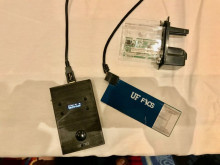To Detect Bombs Efficiently and Cheaply, Try Using Wi-Fi
You probably use Wi-Fi on the regular to connect your smartphone, computer, or other electronic device to the glory of the world wide web. But soon, that same technology could also keep you safe in real-life public areas.
According to a peer-reviewed study led by researchers from Rutgers University-New Brunswick, ordinary Wi-Fi can effectively and cheaply detect weapons, bombs, or explosive chemicals contained within bags.













































































